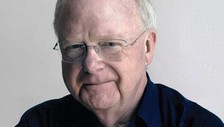
Louis Andriessen (1939, the Netherlands), originally studied with his father and Kees van Baaren at the Royal Conservatory of The Hague, before embarking upon two years of study with Italian composer Luciano Berio in Milan and Berlin. He later joined the faculty of the Royal Conservatory. In 1969 Andriessen co-founded STEIM in Amsterdam. He also helped found the instrumental groups Orkest de Volharding and Hoketus, both of which performed compositions of the same names. He later became closely involved in the ongoing Schonberg and Asko ensembles and inspired the formation of the British ensemble Icebreaker.
Andriessen’s early works show experimentation with various contemporary trends: post war serialism (Series, 1958), pastiche (Anachronie I, 1966–67), and tape (Il Duce, 1973). His reaction to what he perceived as the conservatism of much of the Dutch contemporary music scene quickly moved him to form a radically alternative musical aesthetic of his own. Since the early 1970s he has refused to write for conventional symphony orchestras and has instead opted to write for his own idiosyncratic instrumental combinations, which often retain some traditional orchestral instruments alongside electric guitars, electric basses, and congas. Andriessen’s mature music combines the influences of jazz, American minimalism, Igor Stravinsky and Claude Vivier. Other notable works include Workers Union (1975), a melodically indeterminate piece „for any loud sounding group of instruments”; Mausoleum (1979) for 2 baritones and large ensemble; De Tijd [‘Time’] (1979–81) for female singers and ensemble; De Snelheid [‘Velocity’] (1982–83), for 3 amplified ensembles; De Materie [‘Matter’] (1984–88), a large four-part work for voices and ensemble; collaborations with filmmaker and librettist Peter Greenaway on the film M is for Man, Music, Mozart and the operas Rosa: A Horse Drama (1994) and Writing to Vermeer (1998); and the recent La Passione (2000–02) for female voice, violin and ensemble.
Honours: The 2011 University of Louisville Grawemeyer Award for Music Composition for the multimedia opera La Commedia (2004–2008).
The Memory of Roses (1992) for piano (+ toy piano) and Deuxieme chorale (1992) for hand-operated music box – Six years ago when Jeanette Yanikian and I were in the States, my friend and ex-pupil Ron Ford looked after my house, and when he started exploring the cupboards (anything went) he came across the rough draft of Wals (Waltz) for piano, written for Reinbert de Leeuw on the occasion of the completion of Abschied. Ron liked the piece and it made him curious to see other special occasion pieces. That was the moment he conceived the idea of a cd of short pieces. He called it Marginalia. The twenty-three pieces were chosen after a process of careful selection (my cupboards proved to contain a lot more of these short pieces) of playing, of putting back ashamedly and of programming. There weren’t to be too many piano solo pieces for instance, (because there was a time when friends and family would get a Felicitatie for piano on their birthday cards, in G minor, of which Menuet for Marianne and Romance for Caecilia are examples), and the idea was that there should be a certain variety of instruments. We furthermore decided to observe as strictly as possible a chronological order of pieces. We furthermore decided to observe as strictly as possible a chronological order of pices. The two recording days in July 1993 went by most pleasantly: friends and musicians dropped in and by, they were all served with coffee and wine and this all in the wonderfully inspiring location of the Waalse Kerk in Amsterdam.


